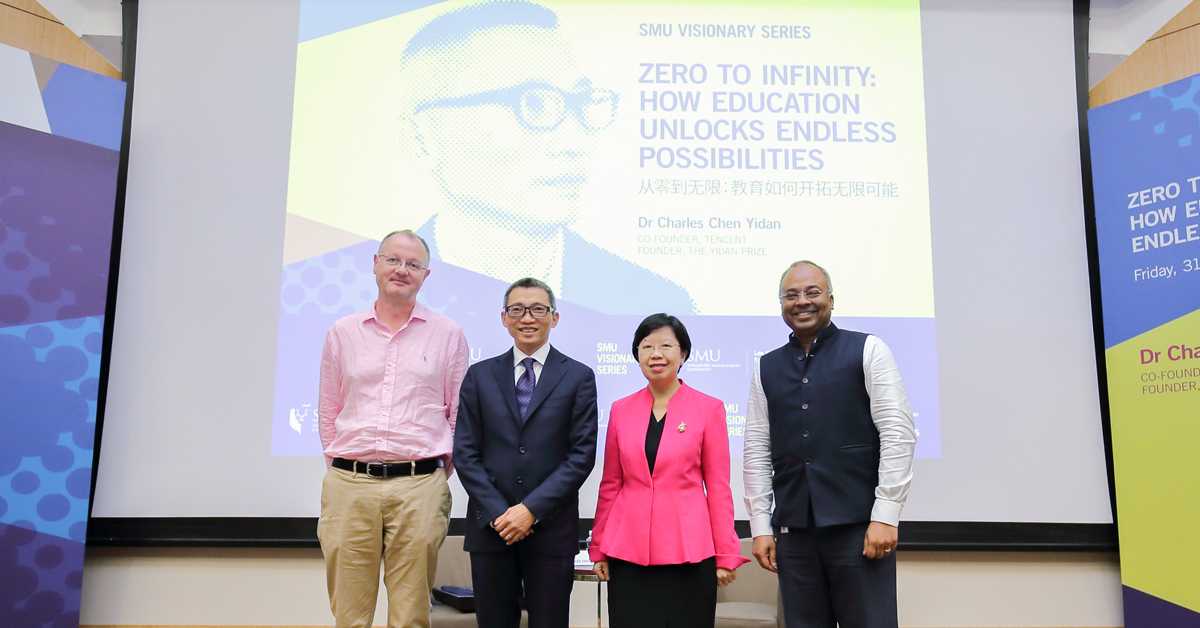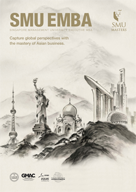
From John D Rockefeller, who established the Rockefeller Foundation over a century ago, to Bill Gates - who has donated over US$45 billion in grant payments via the Gates Foundation since its inception, charitable billionaires have been extending their influence from the business world to that of philanthropy.
On the illustrious list of do-good billionaires is Charles Chen Yidan, one of five founders of China mega-conglomerate Tencent - the maker of platforms like WeChat. Dubbed “China’s most charitable man”, Mr Chen has reportedly donated US$359 million in 2017, most of it towards a cause close to his heart - education.
“Everyone has the unique potential to unlock the infinite possibilities that education provides,” declares Mr Chen, who was in Singapore to deliver the inaugural address in the SMU Visionary Series - Zero to Infinity: How Education Unlocks Endless Possibilities.
Beyond dispensing words of inspiration, Mr Chen is a firm believer in the power of education. In fact, while he was spearheading the tech conglomerate co-founded with fellow classmates, the group had launched the Tencent Foundation - a pioneer in China for private companies with charitable ambitions. Then, he left his role as chief administrative officer of the business behemoth to focus on philanthropy - creating the Yidan Prize in 2016.
The world’s largest education prize, the namesake awards comprises the Yidan Prize for Education Research and Yidan Prize for Education Development. Through a series of initiatives, the prize aims to engage the global community in conversation about education and to play a role in education philanthropy.
“Education begins with the individual, but its impact extends far beyond the individual,” says Mr Chen.
“The teacher-student relationship may be personal, but it carries a lineage of knowledge, skills and beliefs that is the crystalisation of the teacher’s wisdom.
And the relationship carries the hope of society. Education is the backbone of modern day civilisation. It’s the force for technological innovation, social progress, cultural and life values, and justice and equality.”
Specifically, Mr Chen believes in the ability of education to transform lives, having personally reaped its benefits. In fact, his family’s fortunes took a turn for the better when his illiterate grandmother invested in his father’s education, enabling the latter to pursue a university education.
“Education carries the hope of elevating entire communities of people,” says Mr Chen, whose family is in the banking industry.
“Asian wisdom is rooted in Confucianism - knowing right from wrong, how society works, and how to lead a meaningful life. In the West, the Greek philosophers believed the one key objective is to attain knowledge necessary for both interests of individual and society.”
And although his billions were made on the back of technological innovation, he is certain that education will continue to play an important role, even in an age of digitalisation. Mr Chen explains that the Chinese phrase for education, 教育 (jiao yu), means not just “to teach”, but “to nurture”. As such, learning is not simply about academic smarts and the next big breakthrough, but the inculcation of deeper human values.
“Jiao yu takes place throughout the life cycle of a human being, even before birth as a mother nurtures the baby in the womb, to death,” says Mr Chen.
“Before we had nothing, now with TV and the Internet, these tools help nurture a better value system. How do we use these tools to touch everyone’s souls, and create content to reflect our values and culture, to cultivate future leaders and future technological innovation, and train people to embrace the future? Is the machine controlling mankind, or vice versa?
We are at the point when we have to rely on human values, such that no matter the innovation, humans are the masters of technology.”
Moreover, Mr Chen expresses the growing impact of technology on the workforce, with up to 47 per cent of jobs about to cease to exist in the next 25 years. But rather than fear the onslaught of technology and the replacement of a human workforce with that of artificial intelligence, Mr Chen emphasises on the need to innovate to harness the potential of technology - starting with educational institutions.
“Education should promote student engagement and create a learning environment that fosters innovation,” says Mr Chen.
“When innovative ideas are then fed into the tech sector, a powerful creative synergy is born. The chemistry between Stanford University and Silicon Valley is a perfect symbol of how schools and the public sector could strive together, and reinforce innovation in each other’s DNA.”
Mr Chen describes Stanford as “a farm system for Silicon Valley”. It has licensed 8,000 campus inspired inventions, and as many as 5,000 companies can be traced back to Stanford educators and students such as Google, Cisco, Sun Microsystems, eBay, Netflix and LinkedIn.
“The entrepreneurial spirit allows Stanford to forge a symbiotic loop with the tech sectors of Silicon Valley, with a diverse body of students encouraged to learn for the sick of learning, to take risks, to try new things and discover new terrains.”
Likewise, Mr Chen noted the inextricable and lucrative bonds between centres of higher learning with that of industry and international partners, in globally connected economies such as Singapore. This collaboration among sectors will help propel innovation in all fields.
“Necessity is the mother of invention. But in a world where basic needs for survival have been met, education is the mother of innovation, and innovation is the modern day necessity,” adds Mr Chen.
“Innovation is not a solo endeavour. When we think of innovation we have a mental picture of a single lightbulb moment. But it is a collaboration, not something achieved by one person or a single organisation.”
“Lifelong learning ability is very important, not just in the classroom, but about experience and competence to embrace the future. How to deal with problems and challenges, how to have a mindset of lifelong learning - that is the most important.”
Speak to our Admissions Advisors
Lee Kong Chian School of Business
Postgraduate Admissions
Singapore Management University,
SMU Administration Building
81 Victoria Street, Singapore 188065
Tel: +65 6828 0882
Join us at the upcoming events
Ofukacho, 1−1 ヨドバシ梅田タワ
Osaka, Kita Ward, 〒530-0011, Japan
Kyobashi, 1 Chome−3−5 三井ガーデンホテル 1F
Chuo City, Tokyo, 〒104-0031, Japan
